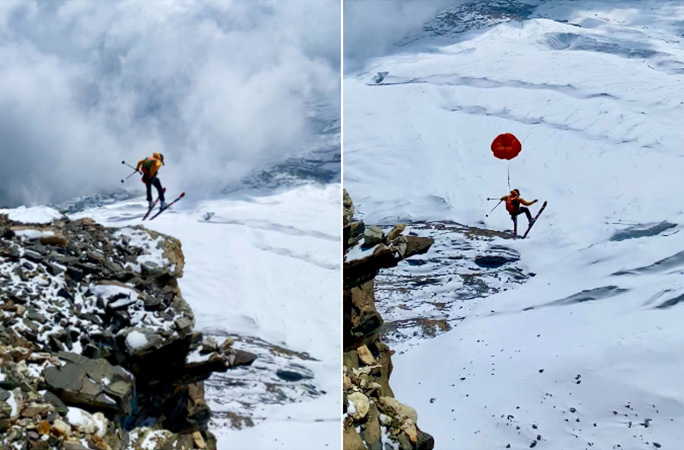
A British man, Joshua Bregmen, broke a Guinness World Records for the world’s highest altitude ski-BASE jump. The 34-year-old jumped off the Himalayan mountain, Mera Peak, a 5,716-meter high cliff (18,753 ft), and parachuted to the ground. Bregman easily beat the previous record of 4,359 m (14,301 ft), set by Frenchman Matthias Giraud in 2019.
Ski-BASE jumping combines the sports of skiing and BASE jumping into one exhilarating sport. Bregman spent over two weeks preparing for the attempt with his team, including hiking and skiing to the jump spot, camping at extreme altitudes, and clearing the course of debris. This record-breaking achievement is even more impressive because it was accomplished entirely without any sponsors.
- Related Article: 63-Year-Old Utah Man Sets World Record with Over 7 Million Vertical Feet Skied in a Season
Everyone has heard of breaking a Guinness World Records, but what does it actually take to achieve this? First, each record title must fulfill all of the following criteria.
According to Guinness World Records, they must be:
- Measurable – Can it be measured objectively? What is the unit of measurement? Guinness does not accept applications based on subjective variables. For example – beauty, kindness, loyalty.
- Breakable – Can the record be broken? Guinness record titles must be open to being challenged.
- Standardisable – Can the record be repeated by someone else? Is it possible to create a set of parameters and conditions that all challengers can follow?
- Verifiable – Can the claim be proven? Will there be accurate evidence available to prove it occurred?
- Based on one variable – Is the record based on one superlative and measured in one unit of measurement?
- The best in the world – Has anyone else done better? If your record suggestion is new, then Guinness World Records will set a challenging minimum requirement for you to beat.
Guinness assesses all new record titles against our values of integrity, respect, inclusiveness, and passion. As such, it has a number of internal policies that all records must adhere to. For example, Guinness does not endorse:
- Unsuitable activities or those which could cause potential harm or danger to spectators.
- Any records that endanger or harm animals.
- Excessive eating. All of Guinness’ eating records are limited to short time periods and small quantities of food, such as fastest time to eat three cream crackers.
- Food wastage. We require any record relating to food to follow strict policies regarding food consumption and donation.
- Any record involving the consumption of alcohol as part of drinking contests, binge drinking or speed drinking.
- Illegal activities in pursuit of record-breaking.
- People under the age of 16 to attempt or hold records which are considered unsuitable for minors.
Guinness’ policies are regularly reviewed and updated in collaboration with expert organizations and based on feedback from our readers.
Now that you know the Guinness rules, will any of our readers try to break one this season?